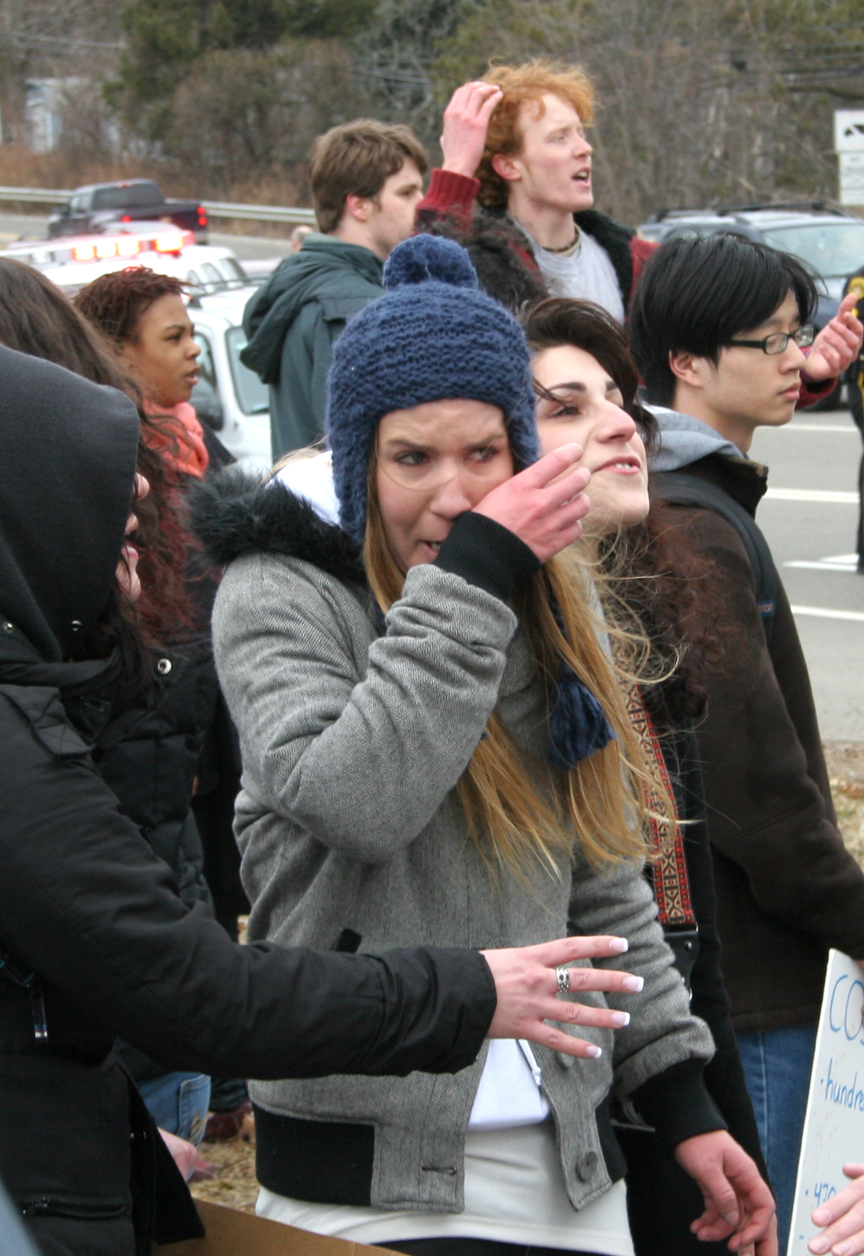
The aftermath of a protest that landed nine people — eight of them were students — in jail more than two weeks ago is still unraveling as grievances, complaints and charges continue to be filed and dropped.
A grievance filed against the Experimental Media Organization, the student group responsible for organizing the initial protest on campus on March 18, with the Student Association was dropped this week, but some of those who participated in the rally have filed complaints against police.
The demonstration, which started on campus with about 60 participants, continued in an off-campus march toward the Army Recruitment Center at University Plaza but ended in a face-off with police right before they reached the Center. Nine people were arrested, but only three — BU students Andrew B. Epstein, David Bittner and Thomas A. Pieragastini — were held on $500 bail. Charges for the nine included resisting arrest, disorderly conduct and obstructing governmental administration.
Other protesters raised bail money for Epstein, Bittner and Pieragastini, who were released after a few hours, but a date has yet to be set for the arraignment.
“We’re still conducting our investigation,” said Broome County Assistant District Attorney Brian Leeds.
John Butler, Vestal’s chief of police, said officers tried to get protesters to “walk on the inside lane down to the Plaza.” By then the march had backed up traffic on the Parkway, and two motor vehicle accidents had occurred — in at least one, the driver was trying to get a better look at the protest.
According to Butler, when one student jumped in front of a police car that was following the group, the officer had to brake suddenly. When the officer got out of the car to take the student into custody, other protesters started antagonizing him, Butler said.
“When the people who were arrested started to shove,” Butler said, police began to use pepper spray.
But protesters’ accounts of police vary from what officials say. Many of the demonstrators say the arrests came suddenly when they started to turn off the Parkway onto Plaza Drive.
“The police force [in the area] doesn’t have the most experience with crowd control and that showed,” said Seamus Dolan, a BU senior who was at the rally but was not arrested.
Dolan said he and other demonstrators started yelling “shame on you!” and other insults at police once some people were arrested.
“We were yelling at the cops, calling them fascists … You’re allowed to yell at the cops; it’s not against the law,” he said.
Although Dolan has not filed any complaints against the police, he said he is planning on doing it soon.
According to Peter Orville, an attorney representing several of the arrested protesters, the next phase in legal proceedings is for the district attorney to offer a plea. The vast majority of cases like this one, he said, never go to trial.
Several protesters noted that they did not fight back when taken into custody, though they were charged with resisting arrest.
“At no point did I resist the officer,” said Bittner, explaining that he was arrested and pushed to the ground by police after trying to mediate the situation between the officers and another student.
“I went limp,” said Joseph R. Golowka, a graduate student at BU who was arrested and charged with resisting arrest, disorderly conduct and obstructing governmental administration in the second-degree. When officers used a zip tie to restrain him, it was so tight that his hands went numb, Goluwka said.
Orville also noted that it did not seem like any of the protesters went to the demonstration with the intention of getting arrested.
But in a grievance filed against EMO through the SA, Mike Saltzman said that the actions of the group were unwarranted and dangerous.
“I support what they’re doing and I’m against the war in Iraq, but what they were doing was a public safety hazard,” said Saltzman, who is the general manager of WHRW but stressed that he was acting as a concerned student when he filed the grievance. “What if there were ambulances that got caught in traffic? What if there were a fire truck that had to take a slower route to a fire?”
According to Saltzman, threats forced him to withdraw the grievance.
Members from EMO could not be reached for comment concerning the grievance.


